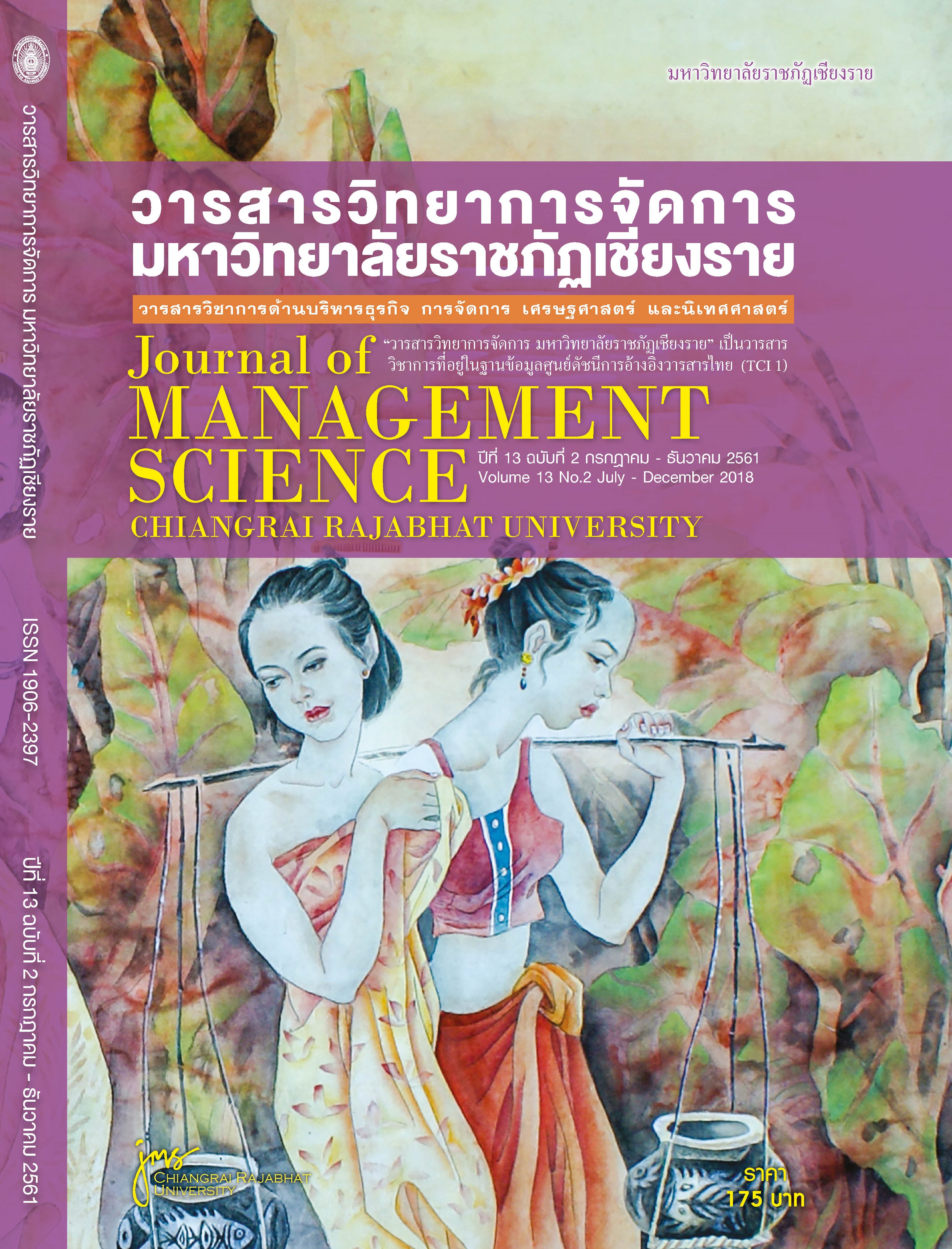Sufficiency Economy Philosophy: A Way towards Business Sustainability
Main Article Content
Abstract
Business Economy Philosophy has been adopted in individuals, communities, private sector and nations. Many business owners perceived that Sufficiency Economy Philosophy is only for individuals and agricultural sector. For business sector, they tend to expand their business for more profit, which is similar to the concept of Anglo/American that consider primarily on shareholders. To make a business survive and success, it requires many factors such as money, knowledge, human resources and a good management. Furthermore, business stakeholders such as suppliers, competitors, communities and society are also important for its success, which means that business needs to consider about the well-being of their stakeholders in order to make the business success and sustainable, which is similar to the concept of Rhineland and Sufficiency Economy Philosophy. The core of this philosophy is to guide people to live their lives in moderation, reasonableness and self-immunity. Business organizations in different industries implement Sufficiency Economy Philosophy practices differently. This article presents Sufficiency Economy Philosophy as an approach to sustainability for business sector in Thailand. The article will discuss the concept of SEP and the implementation of SEP in business.
Article Details
Views and opinions expressed in the journal do not necessarily reflect those of the editors.
References
Buranapin, S., & Ratthawatankul, T. (2015). PHILOSOPHY OF SUFFICIENCY ECONOMY AND BUSINESS SUSTAINABILITY: A FRAMEWORK FOR OPERATIONAL IMPLICATIONS. Journal of Business and Behavioral Sciences, 27(1), 115-141.
Elkington, J. (1994). Towards the sustainable corporation: Win-win-win business strategies for sustainable development. California management review, 36(2), 90-100.
Kantabutra, S. (2005). Applying Sufficiency Economy Philosophy in business organizations: A case of Sa Paper Preservation House. (Unpublished manuscript) Bangkok: Sufficiency Economy Unit, Office of National Economic and Social Development Board, Thailand.
Kantabutra, S. (2006). Relating vision-based leadership to sustainable business performance: A Thai perspective. Kravis Leadership Institute Leadership Review, 6 (Spring): 37-53.
Kantabutra, S. & Gayle C. Avery, (2011) "Sustainable leadership at Siam Cement Group", Journal of Business Strategy, Vol. 32 Issue: 4, pp.32-41.
Kusumavalee, S. (2005). Applying Sufficiency Economy Philosophy in business organizations: A case of Siam Cement Group. (Unpublished manuscript) Bangkok: Sufficiency Economy Unit, Office of National Economic and Social Development Board, Thailand.
Mongsawad, P. & Thongpakde, N. (2016). Sufficiency Economy Philosophy: A holistic approach to economic development and mainstream economic thought. Asian Social Review, 12(7), 134-142.
National Economic and Social Development Board (NESDB). (2004). What is Sufficiency Economy?
Nuttavuthisit, K. (2005). Applying Sufficiency Economy Philosophy in business organizations: A case of Pranda Jewelry. (Unpublished manuscript) Bangkok: Sufficiency Economy Unit, Office of National Economic and Social Development Board, Thailand.
Office of the Royal Development Project Board. (2017). 47 Sufficiency economy learning center. Retrieved 16 October, 2017, from http://www.rdpb.go.th/Knowleged Center
Piboolsravut, P. (2004). Sufficiency economy. ASEAN Economic Bulletin, 21(1), 127- 134.
Pope, J., Annandale, D., & Morrison-Saunders, A. (2004). Conceptualising sustainability assessment. Environmental impact assessment review, 24(6), 595-616.
Puntasen, A., Premchuen, S. & Keitdejpunya, P. (2003). Application of the royal thought about the Sufficiency Economy in SMEs. Bangkok: Thailand Research Fund.
Roger,P.P., Jalal, K.F., & Boyd, J.A. (2008). Sustainable development indicators. An introduction to sustainable development. London, UK: Earthscan.
Suwanraks, R. (2000). Summary of discussion: The 1999 TDRI Year-end conference. TDRI Quarterly Review, 15(1): 6-17.
Thongpakde, N. (2005). Thailand’s Economic Development and the Philosophy of Sufficiency Economy. Unpublished.
Willard, B. (2012). The new sustainability advantage: seven business case benefits of a triple bottom line. New Society Publishers.
Wilson, M. (2003). Corporate sustainability: What is it and where does it come from? Ivey Business Journal Online, March.
Wibulswasdi, C., Piboolsravut, P., & Pootrakool., K. (2012). Sufficiency economy philosophy and development. Bangkok: Project to support the “Sufficiency Economy” Drive in Educational Institutions and to Young People. The Crown Property Bureau.
United Nations Development Programme (UNDP). (2007). Thailand human development report 2007: sufficiency economy and human development. Bangkok: UNDP.


